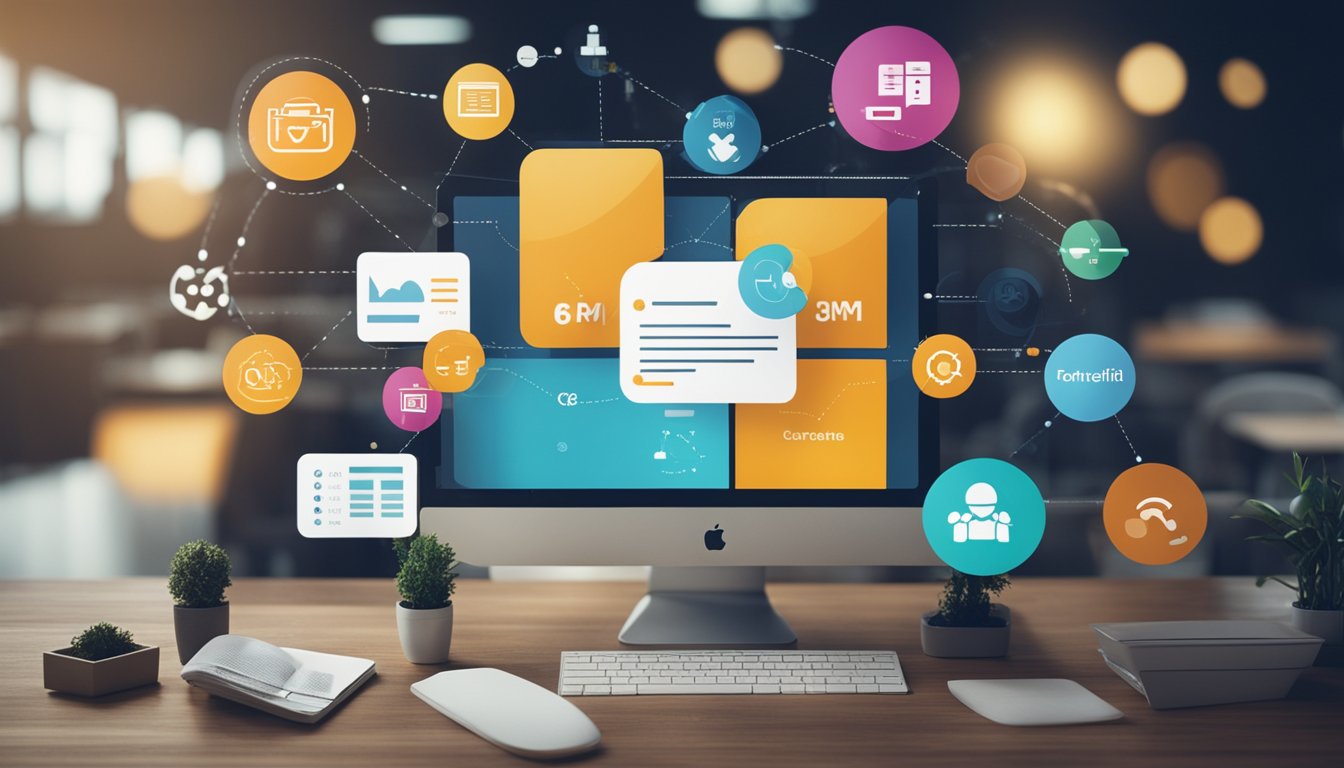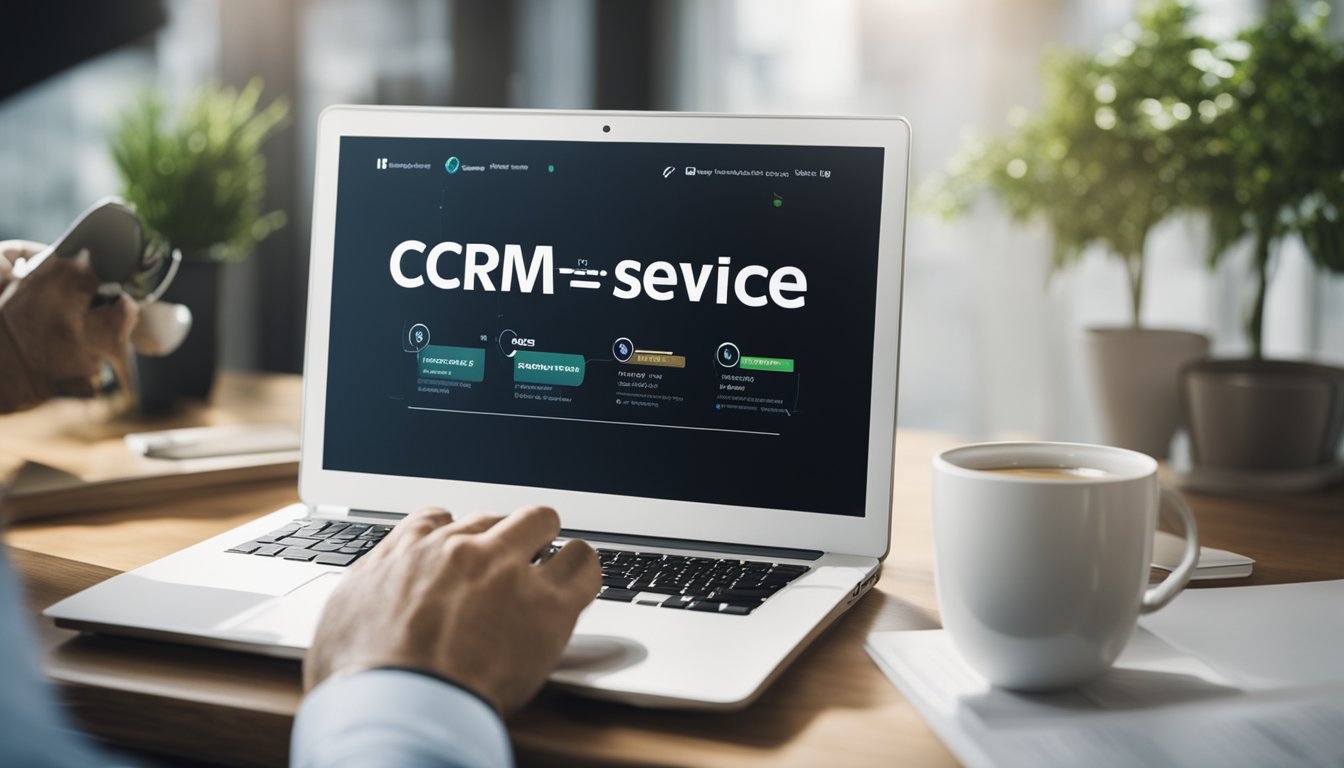
Integrate Your CRM with Your Customer Service Software A Smart Move for Your Business
Integrating your CRM with your customer service software is a crucial step towards improving your customer experience. By doing so, you can streamline your customer service operations, gain a 360-degree view of your customers, and provide personalize
Integrating your CRM with your customer service software is a crucial step towards improving your customer experience. By doing so, you can streamline your customer service operations, gain a 360-degree view of your customers, and provide personalized support. In this article, I will discuss the benefits of integrating your CRM with your customer service software, how to do it, and how to maintain security and data protection during integration.

CRM and customer service software integration can help you provide better customer support by giving you a complete picture of your customer's journey. By integrating your CRM with your customer service software, you can see all customer details stored in your CRM, including their purchase history, preferences, and contact information. This information can help you provide personalized support and improve your response time. In addition, integrating your CRM with your customer service software can help you track customer satisfaction, which is crucial for retaining customers and improving your overall customer experience.
To integrate your CRM with your customer service software, you need to choose the right software and follow a few simple steps. You can choose from a variety of CRM and customer service software, including Bitrix24, HubSpot Service Hub, Freshdesk, LiveAgent, EngageBay, and Zoho Desk. Once you have chosen the right software, you need to configure the integration settings, map your data fields, and test the integration. Finally, you need to maintain security and data protection during integration by using encryption, access controls, and monitoring tools.
Key Takeaways
- Integrating your CRM with your customer service software can help you provide better customer support and improve your customer experience.
- To integrate your CRM with your customer service software, you need to choose the right software and follow a few simple steps, including configuring the integration settings, mapping your data fields, and testing the integration.
- To maintain security and data protection during integration, you need to use encryption, access controls, and monitoring tools.
Understanding CRM and Customer Service Software Integration

As businesses grow, it becomes increasingly important to manage customer relationships effectively. Customer Relationship Management (CRM) software is an essential tool for this purpose. It allows businesses to track customer interactions, manage sales pipelines, and analyze customer data. However, to fully leverage the benefits of CRM, it's essential to integrate it with customer service software. In this section, I'll explain the role of CRM in business, the importance of customer service software, and the different types of integration.
The Role of CRM in Business
CRM is a vital tool for businesses of all sizes. It helps businesses manage customer interactions, automate sales processes, and analyze customer data. A good CRM system can help businesses improve customer satisfaction, increase revenue, and reduce customer churn. By tracking customer interactions, businesses can identify patterns, predict customer needs, and tailor their sales and marketing efforts accordingly.
The Importance of Customer Service Software
Customer service software is another critical tool for businesses. It allows businesses to manage customer inquiries, track customer issues, and resolve problems quickly. A good customer service system can help businesses improve customer satisfaction, reduce response times, and increase customer loyalty. By integrating customer service software with CRM, businesses can ensure that customer data is up-to-date and accessible to all team members.
Types of Integration
There are two main types of integration - native integration and third-party integration. Native integration refers to the integration of two software systems that are developed by the same company. For example, if a business uses Salesforce CRM and Salesforce Service Cloud, they can integrate the two systems natively. This type of integration is typically easier to set up and maintain.
Third-party integration refers to the integration of two software systems that are developed by different companies. For example, if a business uses HubSpot CRM and Zendesk customer service software, they can integrate the two systems using a third-party integration tool like Zapier or PieSync. This type of integration can be more complex to set up and maintain, but it allows businesses to choose the best software for each function.
In conclusion, integrating CRM with customer service software is essential for businesses that want to manage customer relationships effectively. By doing so, businesses can improve customer satisfaction, increase revenue, and reduce customer churn. There are different types of integration available, and businesses should choose the one that best suits their needs.
Benefits of Integration

Integrating your CRM with your customer service software can bring numerous benefits to your business. In this section, I will highlight some of the most significant benefits that you can expect to see.
Improved Efficiency and Collaboration
One of the most significant benefits of integrating your CRM with your customer service software is improved efficiency and collaboration. By integrating these two systems, you can streamline your processes and reduce the amount of time and effort required to manage customer interactions.
With an integrated system, your customer service team can access all customer data in one place, eliminating the need to switch between different systems. This can help them respond to customer inquiries more quickly and accurately, leading to improved customer satisfaction.
Enhanced Customer Satisfaction and Loyalty
Another benefit of integrating your CRM with your customer service software is enhanced customer satisfaction and loyalty. By providing personalized service and support, you can create a better customer experience that will keep your customers coming back.
With an integrated system, you can track customer interactions across multiple channels, including phone, email, and social media. This can help you identify trends and patterns in customer behavior, allowing you to provide more targeted and effective service.
Personalized Customer Journeys
Finally, integrating your CRM with your customer service software can help you create more personalized customer journeys. By tracking customer interactions and preferences, you can tailor your service and support to meet their specific needs and preferences.
For example, if a customer has a history of purchasing a certain product or service, you can offer them personalized recommendations or promotions based on their past behavior. This can help you build stronger relationships with your customers and increase their loyalty to your brand.
In conclusion, integrating your CRM with your customer service software can bring numerous benefits to your business. By improving efficiency, enhancing customer satisfaction and loyalty, and creating more personalized customer journeys, you can create a better customer experience that will keep your customers coming back.
How to Integrate Your CRM with Customer Service Software

Integrating your CRM with customer service software can help you streamline your business processes, improve customer satisfaction and increase efficiency. There are several ways to integrate your CRM with customer service software, including using APIs, utilizing integration platforms as a service (iPaaS), and leveraging built-in integrations and connector software.
Using APIs for Integration
APIs (Application Programming Interfaces) allow different software applications to communicate with each other. Integrating your CRM with customer service software using APIs can automate tasks such as creating and updating customer records, logging customer interactions, and tracking customer feedback. Many CRM platforms offer APIs that can be used to integrate with customer service software.
Utilizing Integration Platforms as a Service (iPaaS)
Integration Platforms as a Service (iPaaS) are cloud-based platforms that allow you to integrate different software applications without the need for custom code. iPaaS can be used to integrate your CRM with customer service software, as well as other business applications such as marketing automation, accounting, and e-commerce. Some popular iPaaS providers include Zapier, Dell Boomi, and MuleSoft.
Leveraging Built-In Integrations and Connector Software
Many CRM and customer service software platforms offer built-in integrations and connector software that can be used to integrate the two systems. These integrations can automate tasks such as syncing customer data, creating and updating tickets, and logging customer interactions. Some popular CRM and customer service software platforms with built-in integrations include Salesforce, HubSpot, and Zendesk.
Integrating your CRM with customer service software can help you provide better customer service, improve efficiency, and increase revenue. By using APIs, iPaaS, or built-in integrations and connector software, you can automate tasks and streamline your business processes.
Maintaining Security and Data Protection During Integration

As I integrate my CRM with my customer service software, I must ensure that my customer data is secure and protected. I need to take measures to prevent data silos and have a robust data backup and protection plan in place.
Preventing Data Silos
Data silos occur when customer data is scattered across multiple systems and departments, leading to inconsistencies and inaccuracies. To prevent data silos, I need to ensure that my CRM and customer service software work seamlessly together. This can be achieved by integrating the two systems using APIs or middleware. By doing so, I can ensure that customer data is shared across both systems in real-time, and all customer interactions are recorded in one place.
Data Backup and Protection
Data backup and protection are critical to maintaining the integrity and security of my customer data. I need to ensure that my customer data is backed up regularly and stored securely. This can be achieved by using a cloud-based backup solution or an on-premise backup solution. Additionally, I need to ensure that my customer data is protected from unauthorized access. I need to implement strong password policies, limit access to customer data, and use encryption to protect customer data.
To summarize, as I integrate my CRM with my customer service software, I need to ensure that my customer data is secure and protected. I need to prevent data silos by ensuring that my CRM and customer service software work seamlessly together. I also need to have a robust data backup and protection plan in place to maintain the integrity and security of my customer data. By doing so, I can ensure that my customer data is protected and my customers can trust me with their data.
Frequently Asked Questions

What are the benefits of integrating your CRM with your customer service software?
Integrating your CRM with your customer service software provides a 360-degree view of your customer. This helps you understand your customers' journeys from the time of purchase to their current experience with your product or service. Quick access to customer data allows your support team to provide more personalized support. Integrations also enable your CRM to automatically log all of your customer service interactions in one place.
How can CRM integration improve customer service?
CRM integration can improve customer service by providing your team with a complete view of customer interactions, purchase history, and preferences. This information can help your team provide personalized support, resolve issues quickly, and increase customer satisfaction. Integrating your CRM with your customer service software can also automate tasks such as logging interactions, sending follow-up emails, and creating support tickets.
What third-party software can be integrated with CRM for customer service?
There are many third-party software options available for integrating with CRM for customer service. Some popular options include Freshdesk, Zendesk, and Salesforce Service Cloud. These software solutions allow you to manage customer support requests, track customer interactions, and provide personalized support.
What are some popular CRM integration companies?
Some popular CRM integration companies include Zapier, PieSync, and Workato. These companies provide tools to help you integrate your CRM with other business applications, automate workflows, and improve productivity.
Can CRM be integrated with ERP systems?
Yes, CRM can be integrated with ERP systems. Integrating your CRM with your ERP system can provide a complete view of customer interactions, sales, and order history. This can help your team provide personalized support, streamline processes, and improve customer satisfaction.
What are some best practices for using CRM software for customer service?
Some best practices for using CRM software for customer service include:
- Regularly updating customer data to ensure accuracy
- Providing training to your team on how to use the CRM software effectively
- Creating custom fields to capture customer-specific information
- Monitoring customer interactions to identify trends and opportunities for improvement
- Providing personalized support based on customer preferences and history.




